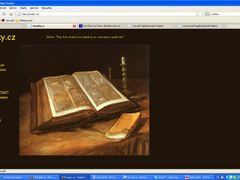Prague - The recent launching of the database containing records of people of interest to the communist-era secret police (StB) has unveiled that the police included in the EZO information system (Record of Persons of Interest) the names of people of Jewish origin.
Aktuálně.cz found out that the StB records contained Jewish family names for some of the names on the list.
For example, the file with information about the author Ivan Klíma includes the name Ivan Kauders. The same applies to the former defence minister Luboš Dobrovský. The StB included the Jewish surname of his father.
The StB considered people of Jewish origin enemies of socialism. In 1971, the secret service launched a secret programme called Pavouk (Spider) whose goal was to create a card registry of all Jews.
Sign of anti-Semitism
In the EZO database, which was published last week by former dissident Stanislav Penc, an additional name, Luboš Hamerschlag, can be found under the date of birth of Luboš Dobrovský, former defence minister.
"It's the name of my father who died in a concentration camp," Dobrovský told Aktuálně.cz. "When my mother remarried, we took the name of our foster father."
By including Dobrovský's family name in the database, the StB made it clear he was a Jew.
"I don't mind being recognised as a Jew as I've always been open about these things," said Dobrovský. "But it's a sign of anti-Semitism and the person who comes across these things should be outraged by anti-Semitism."
Classified as enemies
Luboš Dobrovský was expelled from the Czechoslovak Communist Party in 1970 and later became Charter 77 signatory. After the revolution in the late 1989, he worked as a spokesman for Občanské fórum and the following year took a two-year-job as a minister of defence.
He also headed the president's office under Václav Havel's presidency and later worked as an ambassador to Russia.
His name was mentioned in four documents, according to the EZO. He was identified by the regime as their second most dangerous threat.
Klíma also among persons of StB interest
The StB also listed the Jewish name of the author Ivan Klíma, who spent three years in the Terezín concentration camp. The EZO list links Klíma's date of births with the name of his parents, the Kauders.
Some typical Jewish names, such as Kohn, also appear in the database along with a different name, both linked to the same date of birth.

Due to its long-lasting anti-Semitic activities, the StB was able to keep track of the Jewish families who changed their names after the war, according to experts.
For search reasons
The historian Petr Blažek suggests, however, that the Jewish names did not have to be necessarily added to the database purposefully. "They are not in the database because they were Jewish," he said. "They appear there because the StB wanted to have first-class information for personal identification."
Blažek believes the primary reason for including the names was to make it easier to search in the database.
For the same reason, the StB included all surnames of married women or people who changed their name for other than Jewis origin reasons.
"Yes, the StB was interested to know if someone was a Jew, but it doesn't result from the database," he said. "I think the main reason was to allow for a more effective search in the database. This would not apply to the SEZO database containing such information as who belonged to Zionists."
Sensitive data
The publishing of the EZO database has been targeted by the Office for Personal Data Protection.
"Our office is looking into the registers on its own initiative," said the spokeswoman Hana Štěpánková. "The conclusion has not been made, the matter has been handed to our lawyers who are now looking into potential risks related to the registers publishing."
Štěpánková said that from a general perspective some of the information could be sensitive. "Information regarding someone's origin and geligious affiliation are considered sensitive from the legal point of view," she said. "If abused, the effects could be much worse as oppose to other type of information. This kind of personal data receives the same level of protection as information about the person's health condition or sexual orientation."
Adapted by Prague Daily Monitor.

